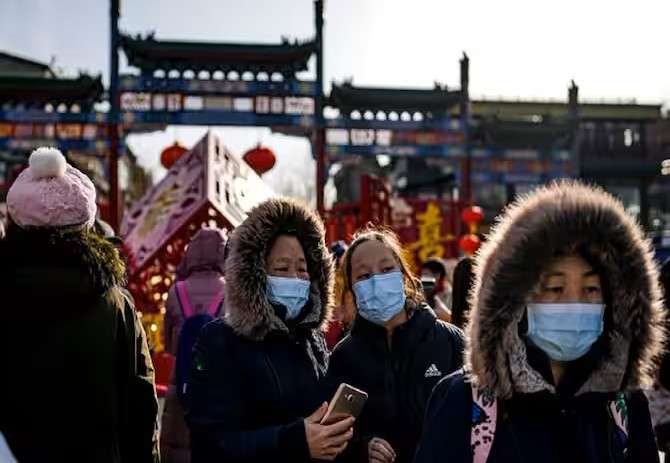Shanghai (Web Desk) — After the government dropped its tight “zero-COVID” policy, people celebrated the Lunar New Year “As a Year of the Rabbit” on Sunday across China with sizable family reunions and crowds visiting temples. This was the country’s largest holiday since the pandemic started three years ago
In China, the Lunar New Year is the most significant yearly holiday. The Chinese zodiac names each year after one of the 12 signs, with the current year being the Year of the Rabbit. In light of the pandemic, celebrations have been subdued over the previous three years.
Most COVID-19 limitations, which had kept millions of people inside, have been loosened.
Finally, folks could take their first trip home to visit their relatives without having to worry about being quarantined, possible lockdowns, or travel restrictions.
For what is known as the Spring Festival in China, broader public celebrations also returned, with the nation’s capital holding thousands of cultural activities on a grander scale than the previous year.
Si Jia, a mother who brought her 7-year-old son to the Qianmen neighbourhood close to Beijing’s Tiananmen Square to experience the festive atmosphere and learn about traditional Chinese culture, said that her son had never experienced what it is like to celebrate a traditional new year because he was too young three years ago and had no memory of that.
At Beijing’s Lama Temple, about 53,000 people prayed, albeit the crowds there seemed less than they had been before the pandemic. Due of safety concerns, the Tibetan Buddhist site only permits 60,000 visitors each day and needs reservations.
In Qianmen, crowds of locals and visitors crowded the pedestrian streets while eating food from barbecue and New Year rice cake stands. Some kids wore traditional Chinese rabbit hats. Others displayed blown sugar or marshmallows in the form of bunnies.
Taoranting Park’s paths were adorned with traditional Chinese lanterns, but there was little trace of the park’s bustling New Year food vendors. This week marks the return of a popular temple fair that had been suspended for three years at Badachu Park.
Wu Zunyou, the director of the Center for Disease Control in China, warned that the widespread mobility of people could contribute to the development of the virus in some locales. However, a significant COVID-19 outbreak will be improbable in the following two to three months due to the fact that the last wave of infection affected 80% of the nation’s 1.4 billion population.
Between January 13 and January 19, the centre documented 12,660 COVID-19-related deaths, including 680 cases of respiratory failure brought on by the virus and 11,980 fatalities from other illnesses including COVID-19. These deaths are in addition to the 60,000 reported last week since the beginning of December. Anyone who passed away on Saturday did so in a hospital, according to the statement that was released.
China has counted only deaths from pneumonia or respiratory failure in its official COVID-19 death toll, a narrow definition that excludes many deaths that would be attributed to COVID-19 in much of the world.
People celebrated by lighting the first incense sticks of the year at Wong Tai Sin, the largest Taoist temple in Hong Kong. Due to the epidemic, the well-known ceremony was put on hold for the past two years.
On Lunar New Year’s Eve, there are typically large crowds present, with everyone rushing to get their incense sticks into the stands in front of the temple’s main hall before 11 p.m. The first people to set their incense sticks, according to worshippers, will have the best chance of having their prayers granted.
Freddie Ho, a local who visited the temple on Saturday night, expressed his happiness at being able to attend the ceremony in person. “I hope to place the first incense stick and pray that the New Year brings world peace, that Hong Kong’s economy will prosper, and that the pandemic will go away from us and we can all live a normal life,” Ho said. “I believe this is what everyone wishes.”
Even though the pandemic has subsided, fewer people were praying for good fortune at Taipei’s famed Longshan Temple than they were a year ago. This is partially due to the fact that many people took long-awaited travels to other regions of Taiwan or beyond.
Vietnamese people were enjoying the Year of the Cat as the rest of Asia ushered in the Year of the Rabbit. There is no official justification for the distinction. However, one explanation contends that cats are well-liked because they frequently assist Vietnamese rice producers in driving rodents away.

